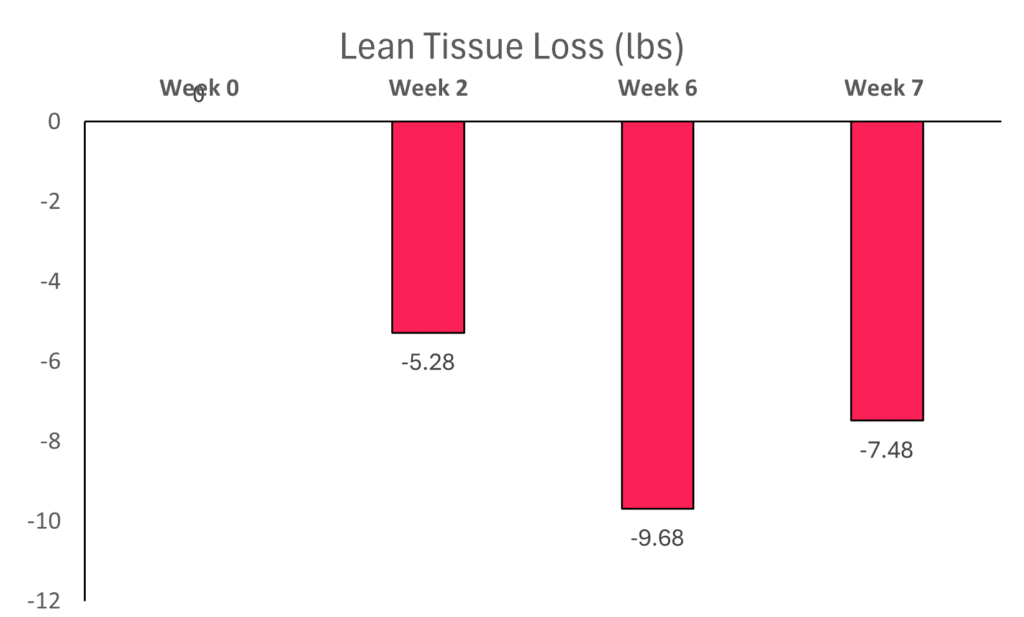When it comes to losing fat, creating a calorie deficit is essential. By consuming fewer calories than your body burns, you force it to tap into stored fat for energy, leading to weight loss. However, many people fall into the trap of believing that if a modest calorie deficit is good, an excessive calorie deficit must be even better. This couldn’t be further from the truth. While a calorie deficit is necessary for fat loss, an excessive deficit can lead to various health risks and undesirable consequences.
What is an Excessive Calorie Deficit?
An excessive calorie deficit is a significant reduction in calorie intake that goes beyond the recommended levels for safe and sustainable weight loss (10% of body weight over 6 months). The exact number of calories that constitute an excessive deficit varies from person to person, depending on factors such as age, gender, height, weight, and activity level. However, a general rule of thumb is that a deficit of more than 500-750 calories per day is considered excessive for most people.
Many individuals fall prey to the misconception that extreme calorie restriction will lead to faster weight loss. While it’s true that a larger deficit will result in more rapid weight loss initially, it’s not a sustainable or healthy approach in the long run.

Metabolic Slowdown
When you consistently consume far fewer calories than your body needs, over time, your metabolism (i.e., the amount of energy you “burn”) will slow down over time. This is known as adaptive thermogenesis. This process will inevitably lead to a decrease in energy requirements as your body weight reduces.
A slower metabolism means that your body burns fewer calories at rest, making it increasingly difficult to lose weight and maintain any progress you’ve made. This can be particularly frustrating for those who have been dieting for an extended period, as they may find that they need to lower their calorie intake to see results continually.
The long-term implications of metabolic slowdown can be significant. Even after returning to a more balanced calorie intake, your metabolism may remain suppressed, making it easier to regain any lost weight and harder to maintain a healthy body composition.

Muscle Loss and Performance Declines
When you consume far fewer calories than your body needs, it can resort to breaking down muscle tissue for energy. This process, known as muscle catabolism, can lead to a significant decrease in muscle mass over time.
The consequences of muscle loss extend beyond just aesthetics. Muscle is metabolically active tissue, meaning that it burns calories even at rest. Therefore, a loss of muscle mass can further slow down your metabolism, making it harder to lose fat and maintain a healthy body composition.
Effect of a very low-calorie diet on metabolism
A study conducted by Eston et al. (1992) investigated the effects of a very low-calorie diet (VLCD) on body composition and exercise performance in moderately obese women. The participants followed a VLCD, consuming only 1695 kJ (approximately 405 calories) per day for 6 weeks.

This figure, adapted from Eston et al. (1992), shows the decrease in lean tissue from week 0 to week 6 on a very low-calorie diet.
The results showed that the participants lost an average of 11.5 kg (25.3 lbs) during the 6-week period. However, a significant portion of this weight loss – 37% – came from lean tissue (shown above), which includes muscle tissue.
The loss of muscle mass during a VLCD can have significant implications for metabolism. As muscle tissue is metabolically active, a decrease in muscle mass can lead to a reduction in resting metabolic rate (RMR). This means that the body burns fewer calories at rest, making it more difficult to maintain weight loss and increasing the risk of weight regain once the diet is no longer followed. During week 7, the participants gained back around three pounds of their body weight after just one week off the diet.
The long-term implications of metabolic slowdown can be significant. Even after returning to a more balanced calorie intake, your metabolism may remain suppressed, making it easier to regain any lost weight and harder to maintain a healthy body composition.
Unsustainable Weight Loss
While an excessive calorie deficit may lead to rapid weight loss initially, it’s rarely sustainable in the long term. Many people find themselves trapped in a cycle of yo-yo dieting, where they lose weight quickly through extreme restriction, only to regain it just as quickly when they return to more normal eating habits.
This pattern of rapid weight loss and regain can be particularly damaging to your metabolism. With each cycle, your body may become more efficient at storing fat and less efficient at burning calories, making it increasingly difficult to lose weight and maintain any progress you’ve made.
Moreover, the intense hunger and cravings that often accompany an excessive calorie deficit can make it challenging to stick to your diet long-term. As a result, many people find themselves falling off the wagon and struggling to maintain their results.
Energy Gap Theory and the Biological Drive for Weight Regain
What makes matters worse is, biologically, you become more efficient at reducing energy (i.e., your metabolism slows down), but your hunger remains the same or, in some cases, increases. This is known as the “Energy Gap Theory.” It helps us to explain why so many people regain weight after a period of body weight restriction.
MacLean et al. (2011) indirectly describes the “Energy Gap Theory” in their paper “Biology’s Response to Dieting: the Impetus for Weight Regain.” This paper provides further insight into the biological mechanisms that contribute to weight regain after diet-induced weight loss, particularly in the context of muscle loss and metabolic adaptation.
The reduction in resting metabolic rate (RMR) that occurs after weight loss, which is often exacerbated by the loss of metabolically active muscle tissue, plays a key role in this process. The decrease in RMR is disproportionate to the loss of body mass, meaning that the body burns fewer calories at rest than would be expected based on the new, lower body weight. This adaptation makes it more difficult to maintain the reduced weight, as it promotes weight regain unless caloric intake is continuously restricted.
Hormonal changes that occur due to dieting
Hormonal changes also play a role in the biological drive for weight regain. Leptin, a hormone that helps regulate appetite, decreases after weight loss, while ghrelin, known as the “hunger hormone,” increases. These changes can lead to increased appetite and reduced feelings of fullness, making it more challenging to stick to a reduced-calorie diet.
The Energy Gap Theory suggests that these hormonal and metabolic adaptations create a mismatch between signals from the body and the brain’s perception of energy status. In other words, even if you’ve regained lost body fat, your brain may still act as if your body is in a state of energy deficit, driving you to eat more and burn fewer calories.

The implications of this theory emphasize the need for comprehensive and long-lasting interventions that address hormonal balance, metabolic rate, and behaviors related to food intake and physical activity to effectively prevent weight regain. By understanding the complex biological factors that contribute to weight regain after dieting, particularly in the context of muscle loss and metabolic adaptation, it may be possible to develop more effective, long-term strategies for managing weight and breaking the cycle of yo-yo dieting.
Healthy Alternatives to Excessive Calorie Deficit
While a calorie deficit is necessary for fat loss, it doesn’t have to be extreme. A moderate calorie deficit of around 500 calories per day is generally considered safe and sustainable for most people. This approach allows for more gradual weight loss, which is more likely to be maintained over time.
In addition to a moderate calorie deficit, emphasizing nutrient-dense foods is crucial for maintaining optimal health and supporting fat loss efforts. Focusing on whole, minimally processed foods that are rich in essential nutrients can help ensure that your body is getting the nourishment it needs, even while in a calorie deficit.
Incorporating resistance training and regular physical activity can also be beneficial when trying to lose fat. Resistance training helps preserve muscle mass, which is essential for maintaining a healthy metabolism and body composition. Engaging in regular physical activity can also help boost your calorie expenditure, making it easier to create a deficit without resorting to extreme restriction.
Finally, adopting a flexible dieting approach can be a more sustainable alternative to excessive calorie restriction. This involves allowing for occasional treats and indulgences while still maintaining an overall calorie deficit. By avoiding strict food rules and rigid dietary restrictions, you may find it easier to stick to your diet long-term and avoid the pitfalls of extreme restriction.
Achieve Sustainable Fat Loss with the Adaptive Workout Builder
If you’re looking for a comprehensive, personalized approach to fat loss that incorporates these principles, consider trying the pro version of our Adaptive Workout Builder. This innovative service creates periodized training and nutrition programs tailored to your specific needs and goals.
The nutrition program incorporates diet breaks and calculates all your servings for the prescribed macronutrients, ensuring that you’re fueling your body optimally for fat loss and muscle preservation. The training program varies your workouts to keep your body adapting and recovering, helping you avoid plateaus and maintain progress.
Additionally, the built-in AI feature allows you to update and ask questions about your workout, providing ongoing support and guidance throughout your fat loss journey. With the Adaptive Workout Builder, you can achieve sustainable, healthy fat loss while minimizing the risks associated with excessive calorie restriction.
Conclusion
In conclusion, while a calorie deficit is a key component of successful fat loss, more isn’t always better. An excessive calorie deficit can lead to a range of health risks, including nutrient deficiencies, hormonal imbalances, metabolic slowdown,and muscle loss. It can also take a toll on mental well-being, increasing the risk of eating disorders and mood disturbances.
Rather than resorting to extreme calorie restriction, it’s important to prioritize a balanced, sustainable approach to fat loss. This involves creating a moderate calorie deficit, emphasizing nutrient-dense foods, incorporating resistance training and regular physical activity, and adopting a flexible dieting approach.
By focusing on health and long-term success, rather than rapid weight loss at any cost, you can achieve your fat loss goals while minimizing the risks associated with excessive calorie restriction. Remember, sustainable progress takes time and patience, but the benefits to your physical and mental well-being are well worth the effort.




Pingback: HIIT vs Steady-State Cardio: Which is Better for Weight Loss? - Counting Kilos
Pingback: Preserve Lean Muscle While Cutting: The Proven Strategies - Counting Kilos
Pingback: Understanding Calorie Deficit: Building Muscle and Losing Fat - Counting Kilos